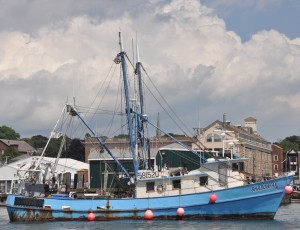
Americans have fought in Libya before.
In 1801 Tripoli declared war on the US – the first state to do so, I believe. Tripoli, Morocco, Algiers and Tunis – ‘the Barbary Pirates’ – operated much like today’s Somali pirates. Though not opposed to killing, they understood the value of humans, whether as hostages or slaves.
As with the Somali pirates, there was a question of why they were allowed to choke commerce. According to Henry Adams:
The four Barbary Powers … lived by black-mail. So little sense of common interest had the nations of Europe, that they submitted to the demands of these petty … despots, and paid yearly sums of money, or an equivalent in ships, arms, or warlike stores…. The European consuls … intrigued to impose heavier conditions on rival commerce. Following the established custom, the United States had bought treaties will all four Powers [in the early 1790s]…. [History of the United States During the Administrations of Thomas Jefferson [rev. ed. 1903] (New York: Library of America, 1986), p. 165.]
Samuel Eliot Morison describes how Jefferson, who had long opposed a standing military, imposed deep cuts on the formidable Navy John Adams had built in response to French threats to American trading vessels [Oxford History of the American People (1965), pp. 352, 358-62].
By the time Jefferson became President [in 1801], almost $2 million [over the prior 10 years], one-fifth of the annual revenue, had been paid to … either to ransom prisoners or in return for permitting American merchant ships to sail the Mediterranean…. [T]he bashaw of Tripoli who, feeling he was not receiving enough tribute money, declared war on the United States in May 1801. [p. 363.]
The war, Morison says, ‘dribbled along in a desultory fashion until 1804….’ [Id.] ‘Embarrassing’ would be more accurate.
In 1803 the USS Constitution’s sister ship, the Philadelphia, ran aground outside Tripoli’s harbor . Its officers and crew were added to the bashaw’s roster of hostages. The Tripolitans refloated the frigate and gained a formidable, modern warship.
In 1804, a storied raid kept ‘Old Ironsides’ safe from the Philadelphia by burning and sinking it. Hence, ‘To the Shores of Tripoli’, line 2 of the US Marine Corps Hymn. The US ultimately prevailed in 1805. [Morison, pp. 363-64; Adams, pp. 591ff.]
Though costly, the victory was important both in itself and symbolically. The safety of travelers from banditry and piracy and the free movement of commerce have been hallmarks of civilization for as long as the concept has existed.
An assertion like that sounds hollow, grandiose – especially after our last President’s speeches. But it is true. The chaos of the Roman 3rd century made travel hazardous on land and sea – something it hadn’t been within the empire for 300 years. The situation grew worse and worse into what came to be called ‘the Dark Ages’. Commerce – goods and information – which under the Romans had flowed unimpeded from eastern Iraq to northwestern England largely halted.
For centuries, commerce and travel stayed that way. Europe lived with the social, economic and political consequences into the 19th century. So, the resurgence of piracy in the Indian Ocean (and in southeast Asia) is an attack on the global civilization that emerged, in no small part, from clearing the sea lanes.
It would have been difficult for me not to think of this history with the stories following on the President’s speech on March 28th. But an Associated Press story (via the Huffington Post) that day struck me:
…India’s navy and coast guard, meanwhile, captured 16 Somali pirates after a three-hour-long battle in the Arabian Sea….
Also, 16 crew members who had been taken hostage by the pirates were rescued from the hijacked Iranian trawler off India’s western Lakshadweep islands on Sunday….
***
The Indian navy has seized around 120 pirates, mostly from Somalia, over the past few months. Two weeks ago, the navy captured 61 pirates when they attacked a naval ship.
Indian warships have been escorting merchant ships as part of international anti-piracy surveillance in the Indian Ocean area since 2008.
Such is the hard war for civilization – for freedom of travel and commerce. The Somali pirates are not done. But India’s under-reported role in this struggle may well be of the same significance as the young United States’s in Tripoli.
-30-
Recent Comments